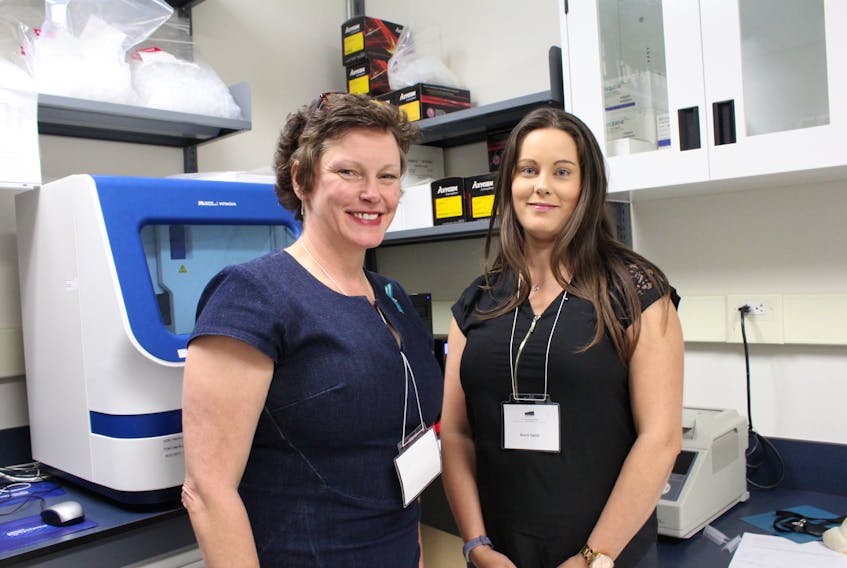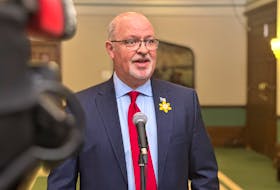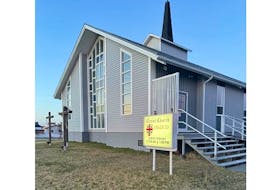ST. JOHN'S, N.L. - At a symposium about ovarian cancer on Saturday, research ongoing in Newfoundland and Labrador offered the audience hope.
A lecture theatre at Memorial University’s Medical Education Centre was filled with people interested in learning more about ovarian cancer — some of whom have the disease or have loved ones who do.
Dr. Lesa Dawson, with Memorial University’s faculty of medicine, is a gynecologic oncologist focused on researching the link between genetics and breast and ovarian cancer.
Her Ovarian Cancer Exposed Symposium lecture, “Advances in Research and Hope for the Future,” was well received.
The audience applauded several times as Dawson discussed the important work underway at her lab — work that, she said, “has gone beyond my wildest dreams.”
Dawson’s research assistant is PhD candidate Kerri Smith.
Smith spoke specifically about the genetics research they’re doing on people with breast and ovarian cancer in the province.
“We think we’ve found a founder mutation,” she said.
“What we’ve found across all of our families studied so far — they all share this (mutation).”
It’s not the commonly discussed BRCA1 or BRCA2, but “this other player.”
Details about the specific mutation are not reported to protect their ongoing research, which is yet to be published.
But what it could mean for breast and ovarian cancer treatment in the future is significant.
“Newfoundland and Labrador breast and ovarian cancer research is well underway with the potential for translational, actionable results,” said Smith.
“This is great on a local level to answer questions about breast and ovarian cancer families in Newfoundland, but … not only are we hopefully impacting our health on a local level, provincewide level, but worldwide.”
Genetics research is not only significant in health care, it can also uncover family connections.
“We managed to link families together,” Smith said, through their pedigree work.
Because of this province’s unique founder population, it’s likely everyone in the five specific families linked by this genetic mutation were descended from one person who settled in the province hundreds of years ago.
It’s just the beginning — Dawson’s team has recruited “many more” families and the lab is just beginning to decipher the genetic causes for ovarian and breast cancer in those other families.
Preventive measures
When Dawson’s team first started researching hereditary breast and ovarian cancer in the province, the rate of women with the BRCA gene mutation getting an oophorectomy at the recommended timeframe was only about 50 per cent.
“Which is terrible,” said Dawson.
“None of these girls should be getting cancer. We know how to prevent it.”
As well, only about 50 per cent of them were getting breast MRIs on a regular basis.
Today, the rate of women getting an oophorectomy when recommended is at 70 per cent.
“Mostly, we think by the research, (it’s) because of our clinic,” said Dawson.
However, the MRI rate is “still weak.”
Dawson said one challenge to improving it is that the people identified as BRCA carriers in the province are “orphaned” by the health care system.
There’s no program following these women, largely because they haven’t had cancer yet, so they don’t fit under a cancer program.
“The only service that’s continuing to follow these people is ours — with no nursing support, no administrative support.”
So, they sent identified BRCA carriers a questionnaire about perceived barriers to opting for preventive measures. In the first two weeks, they’ve already received responses from half of those people.
It’s the kind of work that has found support amongst the audience at the symposium on Saturday.
A fundraising group in attendance, Belles with Balls, presented Dawson with a cheque for $30,000 to support the lab’s continued research.
Twitter: @juanitamercer_









